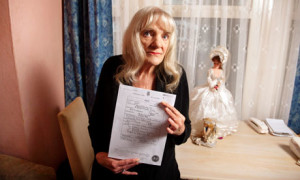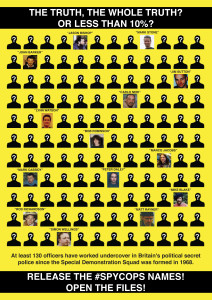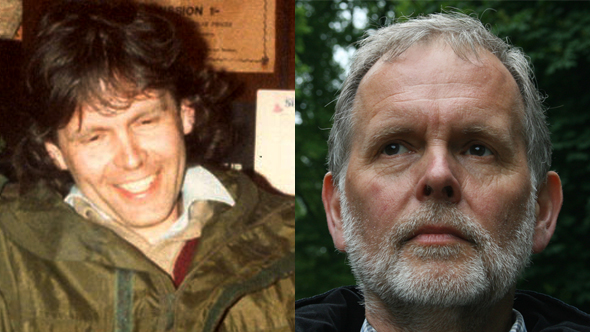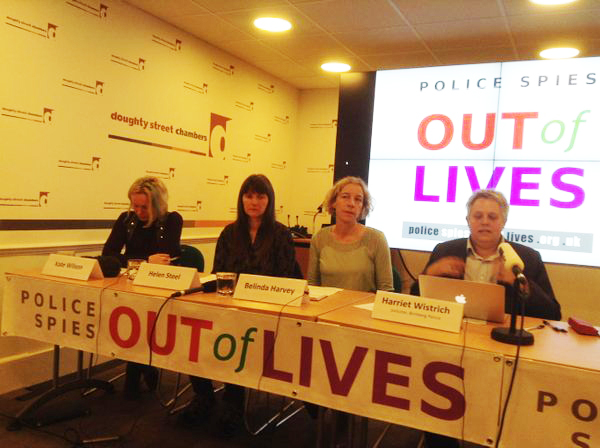Police Snub Parliament’s Spycops Demands
Three years ago today, the first halfway credible official report into Britain’s political secret police was published. The Home Affairs Select Committee had taken evidence from three of the women deceived into relationships by officers – Helen Steel (aka Clare), Alison and Lisa Jones.
Their powerful testimony was overshadowed by that week’s revelation of the fact that Mark Kennedy’s predecessor, the officer known as Rod Richardson, had stolen a dead child’s identity. The real Rod Richardson died when only a few days old.
Pat Gallan, head of the Met’s self-investigation Operation Herne, said they had found a solitary instance of theft of a dead child’s identity five months earlier. Since then, despite the combined efforts of Herne’s 31 staff, they had failed to find any more until activists came forward with the evidence about Richardson. Gallan refused to apologise for the practice.
Perhaps not coincidentally, she was removed from Operation Herne four days later.
The Select Committee took it very seriously.
The practice of ‘resurrecting’ dead children as cover identities for undercover police officers was not only ghoulish and disrespectful, it could potentially have placed bereaved families in real danger of retaliation.
This point is an important one. John Barker died aged 8 of leukaemia. His identity was later stolen by police officer John Dines. After his deployment ended and he disappeared, Dines’ worried and bereft activist partner Helen Steel traced John Barker and went to the house listed on the birth certificate. John Barker’s brother Anthony said
Now, imagine that policeman had infiltrated a violent gang or made friends with a volatile person, then disappeared, just like this man did. Someone wanting revenge would have tracked us down to our front door – but they wouldn’t have wanted a cup of tea and a chat, like this woman says she did.
The Select Committee gave clear instructions to the police.
Families need to hear the truth and they must receive an apology. Once families have been identified they should be notified immediately. We would expect the investigation to be concluded by the end of 2013 at the latest.
In July 2013 Operation Herne published a report into the theft of dead children’s identities, contradicting Gallan’s claim of it being unusual and confirming it was in fact mandatory in the Special Demonstration Squad for decades. Around fifty identities were stolen for use by police.
WHEN IS A RISK NOT A RISK? WHEN IT’S A COVER-UP
The Operation Herne report talked of the police’s ‘essential’ and ‘long-standing policy’ of Neither Confirm Nor Deny (NCND).
As Police Spies Out of Lives, the group representing eight women deceived into relationships by these officers, pointed out
NCND doesn’t have any legal standing. It doesn’t even seem to be a ‘policy’ – no evidence has been presented of a written policy, and in some instances police lawyers have referred to it as a ‘practice’.
They wryly observed
The women launched their legal action in December 2011, but it was not until June 2012 that the police first mentioned NCND in relation to the claim. You might think if there had been such a long standing policy this would have been highlighted in the first police response.
They then listed a number of times when this supposed policy didn’t apply, ranging from media appearances to the Met Commissioner speaking on the record to the Metropolitan Police Authority.
The report’s author, Chief Constable Mick Creedon, agreed that the relatives deserve an apology but said revealing the names used
would and could put undercover officers at risk.
If officers were spying on the likes of Helen Steel, then it is insultingly absurd to say they would be put at risk by being identified. Numerous officers have been exposed for many years – including their real names and photos being widely reproduced in the mass media. The worst retribution any of them has suffered is a few people politely leafleting outside a building that they weren’t actually in.
If the officers really were spying on genuinely dangerous people, then they are leaving the bereaved families at risk. Under witness protection programmes, the police put endangered civilians through court and then organise a new safe life with changed identity . It’s a lot of effort, but it’s only a few cases and society deems it worthwhile in order to ensure justice is done. Plainly, the same could be done if there actually were any former officers who were in a position of risk.
So either way, this refusal to name names is transparent nonsense. It is a decoy, a device for shielding the police from accountability and further condemnation for their actions. No other institution would protect its rampantly immoral staff so vigorously and effectively.
The police admit that they have done wrong to the citizens they are supposed to serve. They agree that they should issue an apology, but have not done so. This demonstrates absolute arrogance.
WHEN IS A REPORT NOT A REPORT? WHEN IT’S A SECRET
The police said they had completed a report into the theft and use of Rod Richardson’s identity, and concluded there were no criminal charges to be brought, nor even misconduct proceedings. What were their reasons? We have no idea because the police would not let anyone see the report, not even Richardson’s mother Barbara Shaw.
Her lawyer, Jules Carey, condemned the secrecy and its part of a wider mosaic of abuse by undercover police.
What we heard this morning was not an apology but a PR exercise. The families of the dead children whose identities have been stolen by the undercover officers deserve better than this. They deserve an explanation, a personal apology and, if appropriate, a warning of the potential risk they face in the exceptional circumstances that their dead child’s identity was used to infiltrate serious criminal organisations.
The harvesting of dead children’s identities was only one manifestation of the rot at the heart of these undercover units which had officers lie on oath, conduct smear campaigns and use sexual relationships as an evidence-gathering tool.
In Ms Shaw’s case, the Metropolitan Police have stated that the investigation into her complaint is complete but they have declined to provide her with a report on the outcome. They have refused to confirm or deny that the identity of her son was used by an undercover officer despite there being only one Rod Richardson born in 1973. And they have concluded that there is no evidence of misconduct or even performance issues to be addressed.
Ms Shaw has told me that she feels her complaint has been ‘swept under the carpet’.
MASTERS AND SERVANTS
The conclusion of the Home Affairs Select Committee’s interim report (the full report never materialised) was unequivocal.
The families who have been affected by this deserve an explanation and a full and unambiguous apology from the forces concerned.
The police simply refused, and that was the end of it.
The Select Committee also said
We will be asking to be updated on the progress of Operation Herne every three months. This must include the number and nature of files still to review, costs, staffing, disciplinary proceedings, arrests made, and each time a family is identified and informed. We will publish this information on our website.
It appears that didn’t happen either. What reason could there be? Either the Select Committee didn’t ask, or the police refused and the Select Committee didn’t make a fuss.
Even as they wallow in a foul cesspool of their own long standing practices, the police feel able to blithely ignore insistent demands of parliament to come clean. And parliament has let them get away with it.


 As the
As the 
